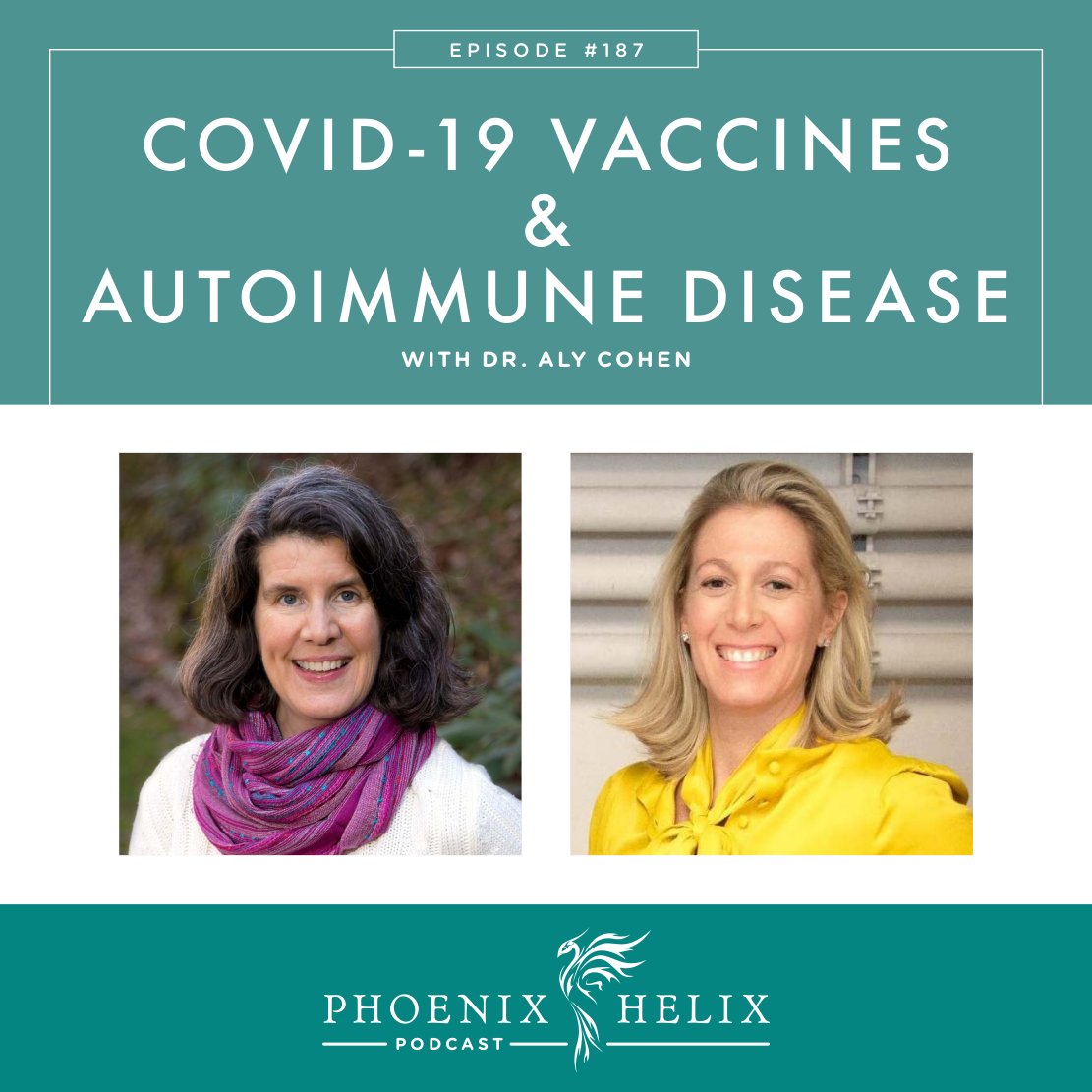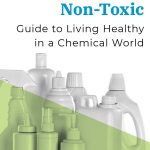COVID-19 Vaccine Q&A with an Integrative Rheumatologist
Dr. Aly Cohen is an integrative rheumatologist who blends both conventional and holistic approaches in her medical practice. She’s been a great resource for accurate coronavirus information since the pandemic began. I interviewed her in Episode 154 about COVID-19 infections among people with autoimmune disease and what factors increased vs. decreased our risk. I invited her back onto the podcast today to talk about vaccines. This is a topic many of you requested when the vaccines first became available in early 2021. At that time, there was no data on people with autoimmune disease because we weren’t included in the initial research studies. Now, enough people have been vaccinated that the data is available, and we’ll be sharing it with you today.
Listen to the Show
- Subscribe to my podcast through your favorite podcast app: iTunes, Stitcher, Google, TuneIn, Spotify, Amazon, etc.
- You can also listen to the episode right here through the player below, and if you subscribe to my newsletter you’ll get notified of future episodes.
Podcast: Play in new window | Download
Show Notes
- Intro (0:00)
- Meet Dr. Cohen
- Dr. Aly Cohen is an integrative rheumatologist.
- I’ve interviewed her twice before on this podcast. In Episode 154, we talked about COVID-19 infections among people with autoimmune disease – what increases and decreases risk. In Episode 120, we took a detailed look at Scleroderma. Dr. Cohen also shared her personal and professional story in that episode.
- Thank You to Our Podcast Sponsor – ShopAIP (2:08)
- Today I’m highlighting their AIP-friendly dehydrated bone broths, soups, and stews. We’re entering the holiday season and many of you may have travel plans. These products are light and easy to carry with you for nutrition as you travel. Birthright Nutrition sells two varieties of bone broth concentrate: chicken or beef. A small 1.35 oz. package makes 32 ounces of gelatinous, rich, organic bone broth. Just add hot water. Wild Zora sells a dehydrated Lemon Chicken Soup in a feather-light envelope that’s a healthy alternative to conventional cup-o-soups. They also sell two dehydrated stews that are hearty meals: Mountain Beef Stew and Savory Chicken.
- ShopAIP is an online store dedicated to the Paleo Autoimmune Protocol. With hundreds of items for the elimination phase of the AIP, and new products labeled by reintroduction category as well. You can find protein bars, sauces and condiments, AIP-friendly spices, cooking and baking ingredients, waffle and pancake mix, delicious snacks, and more.
- If you’re a first-time customer, use the code PHOENIX for 10% off your order. Purchase here.
- Our Goals and a Disclaimer (3:52)
- We know this is an emotional topic and it’s also a very individual one. As always, this podcast isn’t a substitute for medical advice. Our goal is to share accurate, science-based information, answering questions you may have about the vaccines. However, the information we’re providing is general. Always consult with your healthcare team when making medical decisions, including vaccination decisions.
- Our focus today will be on vaccines and autoimmune disease specifically. If you have more general questions about how the vaccines work, I’ll include links to other trusted resources at the end of the interview.
- Vaccine Effectiveness for People with Autoimmune Disease (5:26)
- Overall, these vaccines are very effective at their intended goal: to limit morbidity and mortality from a COVID-19 infection. It was never expected that they would prevent all disease (even mild infections). The goal was to prevent severe disease outcomes – hospitalization and death, and they are successfully doing that. The vast majority of people in hospitals now are unvaccinated.
- Many people don’t realize that mRNA is an old technology but wasn’t utilized widely until the pandemic. Its effectiveness surpassed research expectations.
- When you hear headlines about immunosuppressed patients and the COVID-19 pandemic, that’s a big group of people with a wide variety of diagnoses. Some have autoimmune disease, some are organ transplant patients, and some are being treated for cancer.
- For people with autoimmune disease specifically, vaccine effectiveness depends on many different factors – our level of immune system reactivity, our health overall (other health conditions such as diabetes, high blood pressure, etc.), and the medications and treatments we take to manage our disease.
- COVID-19 vaccines work by exposing the body to the spike protein that is part of the coronavirus, which stimulates our immune system to create B cells, memory cells, and T cells in response that are then available to fight the infection if we eventually get exposed to the actual virus.
- Because many autoimmune medications suppress the immune system to help control autoimmune disease, they may simultaneously suppress vaccine response. If you’re taking immunosuppressant medication, your doctor may recommend pausing your medication briefly surrounding vaccination to help the vaccine be more effective. Advice varies based on the medication and the health of the patient. Consult with your doctor when forming a personalized plan for you. Caveat: this is a temporary pause, not a permanent removal of the medication. One of the best things we can do to lower our risk of a severe infection outcome is to keep our health stable. Autoimmune flares are a risk factor, and stopping medication cold-turkey can induce a flare. Listen to Episode 154 to learn more about what increases and decreases risk for a COVID-19 infection.
- Note: While some immunosuppressant medications have a big impact on vaccine effectiveness, others don’t interfere with vaccine effectiveness at all. It depends on the type. See the resources below for details.
- Resources:
- American College of Rheumatology: COVID-19 News and Vaccine Clinical Guidance.
- Research: COVID-19 vaccination meta-analysis. This looks at the impact of different medications on vaccine response.
- Vaccine Side Effects (16:00)
- Most people do experience mild side effects from the COVID-19 vaccines. You may get a headache, fatigue, achiness, or flu-like symptoms. They usually pass within a few days.
- Severe side effects can happen too, although they are rare. Here’s the list and their prevalence. Anaphylactic reaction (5 people per million), blood clots with J&J (3 people per million), ITP with AstraZenaca (11 per million), Guillain Barre with J&J (15 per million), myocarditis/pericarditis with mRNA (20 per million – most common in male adolescents).
- In the United States, side effects are reported through VAERS (Vaccine Adverse Event Reporting System). And this information is being collected in other countries as well and shared worldwide.
- Side effects among people with autoimmune disease are similar to the general population. Autoimmune flares can happen post-vaccination, but it’s in a minority of patients.
- The truth is, vaccination does carry some risk, but for most people, it’s much lower than the risks associated with a COVID-19 infection. Autoimmune disease is a risk factor for a severe infection outcome. Dr. Cohen has seen this first-hand among her unvaccinated patients. Some have died. Others have developed Long COVID Syndrome. She also has new patients who were healthy prior to getting infected and are now struggling with Long COVID Syndrome.
- Can the Vaccine Cause Autoimmune Disease? Can a COVID-19 Infection Cause Autoimmune Disease? (24:00)
- Some of the rare vaccine side effects are autoimmune diseases: ITP and Guillain Barre. And myocarditis/pericarditis can have autoimmune origins.
- There’s always the potential that stimulating the immune system with a vaccine can trigger the immune system in an autoimmune way, but research shows this is very rare with the COVID-19 vaccines.
- A COVID-19 infection is much more likely to stimulate an autoimmune response than the vaccine, especially if the infection is severe. Autoantibodies are present in 20% of hospital cases. Inflammatory heart conditions occur more often with severe COVID-19 infections than they do as vaccine side effects. The same is true for blood clots, and autoantibodies are often present in hospital patients with this complication. New autoimmune diagnoses are also being reported after infection, but it’s not yet clear if COVID-19 was the cause or simply a correlation. Lastly, there is a theory that Long COVID Syndrome might have an autoimmune component.
- The higher your baseline inflammation if you get infected with COVID-19, the higher your risk of a severe health outcome (autoimmune or otherwise). 6 in 10 people in the United States have a health condition that increases their risk. Listen to my prior interview with Dr. Cohen – Episode 154 – to learn how you can lower your risk.
- Thank You to Our Podcast Sponsor – Sip Herbals Coffee Substitutes (34:47)
- Are you missing coffee on the Paleo Autoimmune Protocol? Not any more! Sip Herbals has created a complete line of delicious drinks for you. Their original herbal coffee is made from just three organic, caffeine-free ingredients: roasted chicory powder, roasted carob powder, and roasted dandelion root powder. It creates a rich, flavorful blend.
- Now, they’ve expanded their line to include five delicious flavors: Pumpkin Spice, Salted Caramel, Dirty Chai, Mocha, and Peppermint Mocha. The Pumpkin Spice & Peppermint Mocha are seasonal flavors, so catch them while you can. You won’t find any artificial ingredients in these mixes. Instead, they’re flavored with real herbs and spices, and they’re all AIP-friendly.
- The other thing I love about Sip Herbals is that it’s a small business started by two women in our community who loved coffee, but learned that coffee didn’t love them back. So, they created a delicious substitute and started Sip Herbals to share it with others.
- To learn more, visit SipHerbals.com and use the code PHOENIX for 10% off your first order.
- Variants, Breakthrough Infections, and Monoclonal Antibodies (36:22)
- Viruses want to survive. Their goal is to find a good host and replicate, and mutation/variation is one way they try to evade our immune system and survive.
- Any person infected with COVID-19 becomes an incubator for virus replication and the potential development of new variants. That’s one of the reasons herd immunity is important to end the pandemic globally by interrupting the rise and replication of variants.
- Even with the variants, vaccines are still effective at reducing the risk of hospitalization and death. Breakthrough infections among the vaccinated are usually mild. Resource: CDC COVID Data Tracker.
- For people with autoimmune disease, vaccine response does vary as we discussed earlier in the podcast. So, you need to be aware of your own risk factors and discuss those with your doctor. People who are at high risk and cannot be vaccinated (or can’t mount an adequate vaccine response) need to be watched closely. Other protective lifestyle choices remain important (social distancing, masks, etc.)
- Monoclonal antibodies are a treatment now available for high-risk patients who are exhibiting mild COVID-19 symptoms, or who have simply been exposed to someone who is infected with COVID-19. They help prevent more severe symptoms, but they need to be given right away, because they’re most effective when given within 10 days of exposure, and they’re not effective when symptoms are already severe. They work by giving the patient the antibodies that their own immune system cannot produce.
- Monoclonal antibodies aren’t a replacement for vaccines. Prevention is the best treatment, and vaccines work preventatively. The antibody treatment is also more expensive and complex to deliver (infusions usually take a few hours). But if you get a breakthrough infection (or cannot be vaccinated), the monoclonal antibodies are an important option in our defense against the pandemic.
- Note: Eileen mentioned that it’s a challenge for her to ask for help when she needs it, so in the past she has delayed calling the doctor because she didn’t want to be seen as a “difficult patient”. Her doctors have assured her that they want their autoimmune patients to call them rather than risk their health. That’s not being difficult. That’s being proactive. Dr. Cohen agrees.
- COVID-19 Vaccine Ingredients (47:52)
- Dr. Cohen does take toxins seriously. She’s the author of the book, Non-Toxic: Guide to Living Healthy in a Chemical World.
- When it comes to non-toxic living, the big picture is the most important thing. What toxins are part of our daily lives and how can we minimize them? Resource: Phoenix Helix Detox Series.
- When it comes to the vaccines, side effects are mild and severe side effects are rare, so she believes the benefits of the vaccine outweigh any risk associated with the inactive ingredients.
- One ingredient that has been researched relating to the rare anaphylactic reactions is polyethylene glycol (PEG). It serves an important role in the vaccine. It coats the nanoparticles which are the active part of the mRNA vaccines and protects them from being destroyed by the body. There’s a 10-day window post-vaccination where our body builds its antibody response to the COVID-19 spike protein. If our body eliminates the vaccine too quickly, we can’t mount an adequate immune response. PEG is present in many other places in our lives, including cosmetics and medications. It’s tolerated well by most people. If you are concerned, you can get a skin-prick allergy test to determine if you are allergic.
- Eileen’s patient experience: I manage rheumatoid arthritis through a blend of diet, lifestyle, mindset, and medication. When I made the decision to go on medication, I tried a number of medications before finding one that put me in remission. The one that finally worked for me is Cimzia (certolizumab pegol) – the only Anti-TNFa medication that is coated in PEG. My doctor explained that it protected the medication to allow it to stay in my body longer and more effectively fight the remaining inflammation. That’s exactly how it worked for me. I know we’re all unique, but I wanted to share my experience.
- Resource: Full COVID-19 vaccine ingredient lists by brand.
- Preparing Your Body for Vaccination (55:58)
- Dr. Cohen understands vaccine concerns. She was concerned herself before getting vaccinated. No one wants to the the “one in a million” rare side effect. What she tells her patients is to get your body “in fighting shape” so you will have the best chance of responding well to anything in life, including vaccination. This includes:
- Stress management – stress wears down the immune system.
- Sleep – detoxification happens while we sleep.
- Nutrition – it supports an effective vaccine response.
- Vitamin D – supports immune system health.
- Minimize daily toxins – PFAS (non-stick chemicals) have been linked to a lower vaccine response.
- Filter drinking water – a lot of chemicals have gotten into our water supply.
- Surround yourself with supportive people – Reducing toxic relationships is as important to health as reducing environmental toxins.
- Booster Shots and Antibody Tests (1:02:03)
- The problem with the antibody tests is that they don’t provide a complete picture. They only test B cell response, not T cell response, and both are part of the vaccine response that protects against COVID-19 infection. In addition, we don’t yet know what level of antibodies is protective. Dr. Cohen does recommend an antibody test for patients who are on strong medications that often interfere with vaccine effectiveness (high-dose steroids, rituxan, cellcept, etc.), and if there are no antibodies at all, that’s a sign a booster is indicated. For other patients, she will offer it if they request it, but with the caveat that it’s only part of the picture.
- The CDC is recommending booster shots for any adult who got the J&J vaccine more than 2 months as go, as well as people with underlying medical conditions who got the mRNA vaccine series over 6 months ago. Dr. Cohen agrees with these recommendations (with some exceptions depending on individual patients’ health). The vaccines do wane in their effectiveness over time, and with the new variants, a booster is wise for many people.
- There is research into mix-and-match vaccines (boosting with a different type of vaccine than your original shot), and it is deemed safe and may even be more protective in some cases. If you have the option of choosing your brand of vaccine booster, the American College of Rheumatology recommends sticking with the same brand for the mRNA vaccines, but if your original vaccine was J&J, they recommend an mRNA booster, because this creates a stronger vaccine response.
- Resource: American College of Rheumatology’s Vaccine Guidance (which is updated regularly).
- Scheduling Your Vaccination (1:07:10)
- Ideally, schedule your vaccination right before one of your days off. That way, if you do experience mild side effects, you can take it easy. If you have small children, try to schedule childcare as well.
- For a few weeks leading up to vaccination, make sure you’re eating a clean, nutrient-dense diet and drinking plenty of filtered water. Research shows that good nutrition can improve vaccine response.
- Taking a high-quality multivitamin can be helpful, and vitamin D if your levels are low.
- Consult with your doctor if you are taking any medications, to determine if they need to be paused surrounding vaccination.
- If you take NSAIDs, it’s recommended you stop those 24 hours prior to vaccination. After vaccination, try to continue to avoid them for another 24 hours, but if you need them to control symptoms after vaccination, that’s fine.
- Also talk to your doctor about any herbal supplements you are taking (like echinacea). Supplements that impact the immune system are best paused surrounding vaccination. You want “a clean slate” for your vaccine response.
- Other COVID-19 Vaccine Questions (1:10:35)
- We focused our conversation specifically on autoimmune disease today. If you have general questions about the science of how these vaccines work and some of the myths circulating on the internet, I recommend two other podcast series.
- Dr. Sarah Ballantyne is a research scientist and a leader in the Paleo AIP Community. She has a multi-episode podcast series on the COVID-19 Vaccines.
- Dr. Heather Zwickey is an integrative immunologist who is a regular guest on The Natural Medicine Journal podcast and answers a lot of questions about the vaccines.
- Outro (1:11:27)
- Dr. Aly Cohen is accepting new patients locally in Princeton, NJ, and she does telehealth consults with people around the world. She also has a passion for non-toxic living. She’s the co-author of the book, Non-Toxic: Guide to Living Healthy in a Chemical World. Follow her on social media for educational posts. She also has a podcast: The Smart Human and a Ted Talk: How to Protect Your Kids from Toxic Chemicals.
- Eileen (your podcast host) is the author of multiple books, written to help people thrive with autoimmune disease. Learn more on the Books Page.
- If you like this podcast, follow or subscribe through your favorite podcast app. You can also subscribe to Eileen’s biweekly newsletter.
- Check out the entire archive of podcast episodes.
You May Also Be Interested In
Spreading the Word
If you like the podcast, please leave a positive review in iTunes. It would mean the world to me, and also helps others find the podcast. Here are some quick instructions using your iPhone:
- If you are already subscribed to my podcast: (1) Click the purple podcast icon. (2) At the bottom of the screen, click Library. (3) At the top of the screen, click Shows. (4) Click the Phoenix Helix podcast image. (5) Scroll down the page, and you’ll see Ratings and Reviews. Scroll down a little bit more and click on Write a Review. This will bring up the review screen. Tap 5 stars (if you love the podcast), and then click in the title box, and it will bring up the keyboard. Enter a title and short review. (6) Click Send in the upper right corner. (7) Thank you! Positive reviews give the podcast a higher search ranking in iTunes, helping people find it and letting them know it’s a quality podcast and worth their time to listen.
- If you haven’t subscribed to my podcast: (1) Click the purple podcast icon. (2) In the lower right corner, click the magnifying class. (3) Type Phoenix Helix in the search box. (4) Click the podcast cover in the Show list. (5) If you’d like to subscribe, click the + sign at the top of the screen. (6) To write a review, scroll down the page, and you’ll see Ratings and Reviews. Scroll down a little bit more and click on Write a Review. This will bring up the review screen. Tap 5 stars (if you love the podcast), and then click in the title box, and it will bring up the keyboard. Enter a title and short review. (7) Click Send in the upper right corner. (8) Thank you! Positive reviews give the podcast a higher search ranking in iTunes, helping people find it and letting them know it’s a quality podcast and worth their time to listen.








